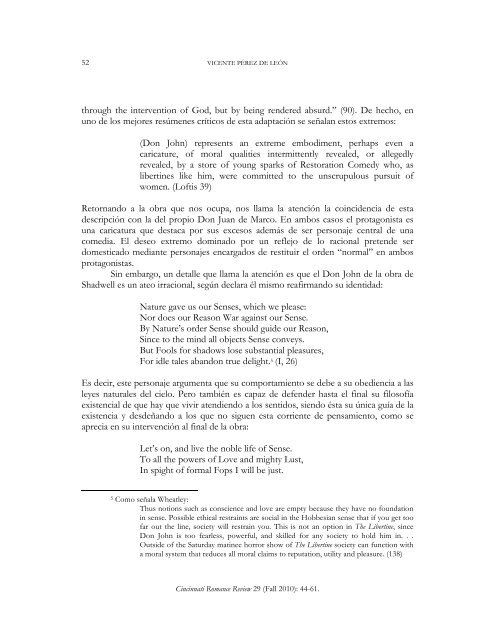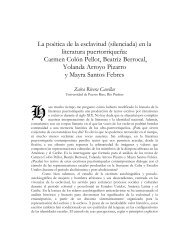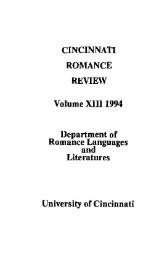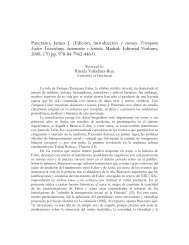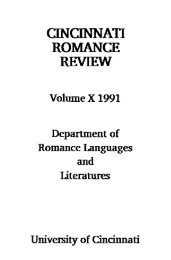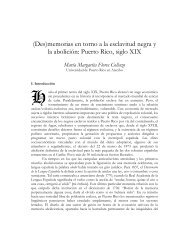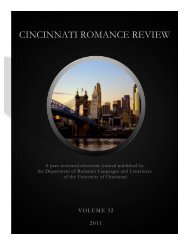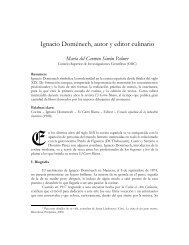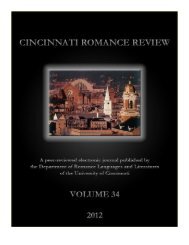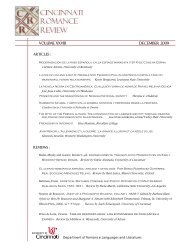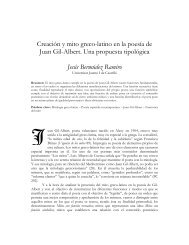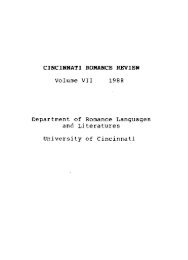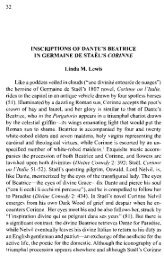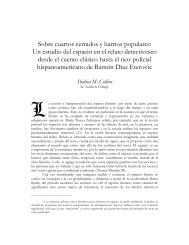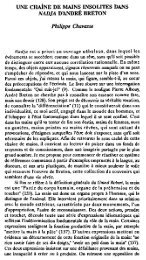Volume 29 - Cincinnati Romance Review
Volume 29 - Cincinnati Romance Review
Volume 29 - Cincinnati Romance Review
You also want an ePaper? Increase the reach of your titles
YUMPU automatically turns print PDFs into web optimized ePapers that Google loves.
52<br />
VICENTE PÉREZ DE LEÓN<br />
through the intervention of God, but by being rendered absurd.” (90). De hecho, en<br />
uno de los mejores resúmenes críticos de esta adaptación se señalan estos extremos:<br />
(Don John) represents an extreme embodiment, perhaps even a<br />
caricature, of moral qualities intermittently revealed, or allegedly<br />
revealed, by a store of young sparks of Restoration Comedy who, as<br />
libertines like him, were committed to the unscrupulous pursuit of<br />
women. (Loftis 39)<br />
Retornando a la obra que nos ocupa, nos llama la atención la coincidencia de esta<br />
descripción con la del propio Don Juan de Marco. En ambos casos el protagonista es<br />
una caricatura que destaca por sus excesos además de ser personaje central de una<br />
comedia. El deseo extremo dominado por un reflejo de lo racional pretende ser<br />
domesticado mediante personajes encargados de restituir el orden “normal” en ambos<br />
protagonistas.<br />
Sin embargo, un detalle que llama la atención es que el Don John de la obra de<br />
Shadwell es un ateo irracional, según declara él mismo reafirmando su identidad:<br />
Nature gave us our Senses, which we please:<br />
Nor does our Reason War against our Sense.<br />
By Nature’s order Sense should guide our Reason,<br />
Since to the mind all objects Sense conveys.<br />
But Fools for shadows lose substantial pleasures,<br />
For idle tales abandon true delight. 5 (I, 26)<br />
Es decir, este personaje argumenta que su comportamiento se debe a su obediencia a las<br />
leyes naturales del cielo. Pero también es capaz de defender hasta el final su filosofía<br />
existencial de que hay que vivir atendiendo a los sentidos, siendo ésta su única guía de la<br />
existencia y desdeñando a los que no siguen esta corriente de pensamiento, como se<br />
aprecia en su intervención al final de la obra:<br />
Let’s on, and live the noble life of Sense.<br />
To all the powers of Love and mighty Lust,<br />
In spight of formal Fops I will be just.<br />
5 Como señala Wheatley:<br />
Thus notions such as conscience and love are empty because they have no foundation<br />
in sense. Possible ethical restraints are social in the Hobbesian sense that if you get too<br />
far out the line, society will restrain you. This is not an option in The Libertine, since<br />
Don John is too fearless, powerful, and skilled for any society to hold him in. . .<br />
Outside of the Saturday matinee horror show of The Libertine society can function with<br />
a moral system that reduces all moral claims to reputation, utility and pleasure. (138)<br />
<strong>Cincinnati</strong> <strong>Romance</strong> <strong>Review</strong> <strong>29</strong> (Fall 2010): 44-61.


